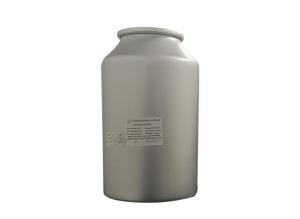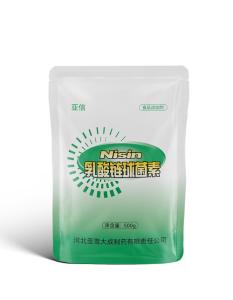

|
- Createtime: 2023-03-06
- Updatetime: 2023-03-10
Product Name: Colistimethate Sodium
Chemical Name: Sodium N-(methylpropanoyl)-N-[(4R,5R,6S)-5-{[(3R,6R,9S,12R,15S,18R,21S)-18-(4-amino-1H-imidazol-5-yl)-15-benzyl-9-(1H-indol-3-ylmethyl)-6-(1H-tetrazol-5-yl)-12-(1H-tetrazol-5-yl)-3-(1H-tetrazol-5-yl)-2,5,8,11,14,17,20-heptaoxo-1,4,7,10,13,16,19-heptaazacyclotricosan-21-yl]pentanamido}-6-(1H-tetrazol-5-yl)hexanamide sulfate
Molecular Formula: C58H105N16Na5O28S5
CAS Number: 8068-37-9
Characteristics:
Colistimethate Sodium is indicated for the treatment of acute or chronic infections caused by susceptible strains of gram-negative bacteria, especially those caused by Pseudomonas aeruginosa. Its clinical efficacy has been confirmed for infections caused by Enterobacter aerogenes, Escherichia coli, Klebsiella pneumoniae, and Pseudomonas aeruginosa. It is also suitable for initial treatment of severe infections suspected to be caused by gram-negative bacteria, and for the treatment of infections caused by susceptible gram-negative bacteria.
Compliance:
Colistimethate Sodium meets the standards of EP, USP, and other international pharmacopeias. The product has obtained European CEP certification.
Storage:
Colistimethate Sodium should be stored in a cool, dry place, protected from light. It should be sealed and stored in a dry place.
Conclusion:
Colistimethate Sodium is a well-established antibiotic medication used to treat a variety of infections caused by gram-negative bacteria. Its clinical efficacy and safety have been confirmed through extensive research and clinical trials. As with all antibiotics, it is important to use Colistimethate Sodium only for the treatment of infections caused by susceptible bacteria, and to use it with caution in patients with kidney or hearing problems.
Colistimethate Sodium Introduction
Colistimethate sodium is a medication used to treat bacterial infections caused by Gram-negative bacteria. It belongs to the class of polymyxin antibiotics and is also known by its generic name, colistin. Colistimethate sodium is primarily used to treat infections caused by multidrug-resistant bacteria, which are resistant to other types of antibiotics. It is administered intravenously or through inhalation, and is available as a powder for injection or a solution for nebulization.
Mechanism of Action
Colistimethate sodium works by binding to the bacterial cell membrane and disrupting its structure, resulting in leakage of cellular contents and cell death. It is primarily effective against Gram-negative bacteria, including Pseudomonas aeruginosa, Acinetobacter baumannii, Klebsiella pneumoniae, and Escherichia coli. Colistimethate sodium has a broad spectrum of activity and is effective against both aerobic and anaerobic bacteria.
Indications
Colistimethate sodium is primarily used to treat infections caused by multidrug-resistant Gram-negative bacteria. It is used to treat infections of the respiratory tract, urinary tract, skin and soft tissues, and bloodstream. Colistimethate sodium is also used in the treatment of bacterial infections in cystic fibrosis patients. The drug is typically used as a last resort treatment option for infections that are resistant to other antibiotics.
Dosage and Administration
The dosage of colistimethate sodium varies depending on the severity of the infection and the patient's age and weight. The drug is administered intravenously or through inhalation. The recommended dosage for intravenous administration is 2.5 to 5 mg/kg/day divided into two to four doses. The recommended dosage for inhalation is 1 to 2 million international units (IU) administered two to three times per day.
Side Effects
Like all antibiotics, colistimethate sodium can cause side effects. The most common side effects include nephrotoxicity, neurotoxicity, and ototoxicity. Nephrotoxicity is the most common side effect and can lead to acute kidney injury. Neurotoxicity can manifest as confusion, dizziness, and muscle weakness. Ototoxicity can lead to tinnitus and hearing loss. Other side effects include gastrointestinal disturbances, allergic reactions, and injection site reactions.
Contraindications and Precautions
Colistimethate sodium should not be used in patients with a history of hypersensitivity to colistin or any of the components of the drug. The drug should be used with caution in patients with renal impairment, as it can cause nephrotoxicity. Colistimethate sodium should also be used with caution in patients with myasthenia gravis, as it can exacerbate muscle weakness. The drug should not be used during pregnancy or breastfeeding, as its safety has not been established.
Drug Interactions
Colistimethate sodium may interact with other drugs, including neuromuscular blocking agents, which can increase the risk of respiratory depression and muscle weakness. The drug may also interact with other nephrotoxic drugs, such as aminoglycosides and vancomycin, increasing the risk of nephrotoxicity.
Conclusion
Colistimethate sodium is an important antibiotic used in the treatment of multidrug-resistant Gram-negative bacterial infections. It is effective against a wide range of bacteria and is used as a last resort treatment option when other antibiotics have failed. However, the drug can cause serious side effects and should be used with caution in patients with renal impairment and myasthenia gravis. It is important to monitor patients for adverse reactions and to use the drug only when necessary.
-
2023-03-13
How is Nisin produced?
Nisin is a naturally occurring antimicrobial peptide that is produced by certain strains of bacteria, particularly Lactococcus lactis. The process of nisin production involves the ...
MORE -
2023-03-14
How is ε-Polylysine hydrochloride produced?
ε-Polylysine hydrochloride, also known as ε-PL or Poly(ε-lysine), is a natural biopolymer composed of ε-lysine monomers. ε-PL is known for its antimicrobial properties and has...
MORE
- Tel:+8618231198596
- Whatsapp:18231198596
- Chat With Skype







